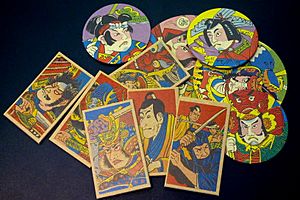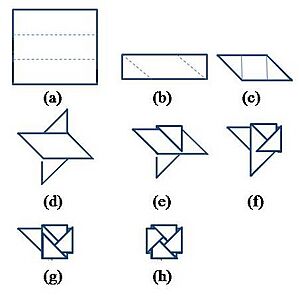Milk caps (game) facts for kids
| Other name(s) |
|
|---|---|
| Players | Poggers |
Milk caps is a fun game that was very popular with kids and teens in the early to mid-1990s. You might know it better by its brand name, Pog.
The name "Pog" comes from a juice brand called POG, which is made from passionfruit, orange, and guava. Before the game became super popular, kids used the actual bottle caps from POG juice to play!
Contents
How to Play Pogs
Playing Pogs is pretty simple and lots of fun! The game uses two main things: milk caps and slammers.
Getting Ready to Play
Milk caps are flat, round cardboard discs. They usually have cool pictures on one or both sides. The older, original milk caps were a bit rougher and sometimes had a staple, just like real bottle caps. Newer, commercial Pogs were thicker and had bright, shiny pictures.
The other important piece is a slammer. This is a heavier disc, often made of metal, rubber, or plastic. Slammers come in different thicknesses and weights. You use the slammer to hit the stack of milk caps. Sometimes, metal slammers are not allowed because they are much heavier. This can give one player an unfair advantage and might even damage the milk caps.
Playing the Game
Rules can change a bit depending on who you play with, but most games follow these steps:
- Each player has their own collection of milk caps and at least one slammer.
- Before starting, players decide if they are playing "for keeps." This means if you win a milk cap, you get to keep it! If you lose one, you have to give it to the winner.
- To start, every player puts an equal number of their milk caps into a stack. The caps are placed face-down.
- Players take turns. When it's your turn, you throw your slammer down onto the top of the stack.
- The slammer makes the stack jump up and the milk caps scatter.
- You get to keep any milk caps that land face-up after your throw!
- Any milk caps that land face-down are gathered up and re-stacked for the next player.
- The game continues until there are no milk caps left in the stack.
- The player who has collected the most milk caps by the end of the game is the winner!
The World POG Federation
The World POG Federation was the official company that published POGs. They helped make the game super popular around the world!
Pogs Around the World
Games similar to Pogs have been played in many different countries for a long time!
Japan's Menko
In Japan, there's a game called Menko (めんこ). It's a card game that dates back to the 1600s! Players use thick paper or cardboard cards. These cards often have pictures from popular anime, manga, or other cool designs. The idea is similar to Pogs: you try to flip your opponent's card by hitting it.
South Korea's Ttakji
In South Korea, a game called Ttakji (딱지) is played. The "cards" for Ttakji are made by folding two square pieces of paper together into a sturdy square. Just like with milk caps, the goal is to flip over the other player's Ttakji card. You might have seen Ttakji played on the popular Korean TV show Running Man!
China's Wáah pín
In China, a similar game is known as wáah pín (畫片). In northern China, it's sometimes called yang pian. These cards can be rectangular or circular.
The Philippines' Teks
In the Philippines, kids play a game called teks. This game uses small collectible cards. At first, the cards had pictures of famous actors. Later, they featured popular comic and cartoon characters. The game involves flipping cards using your thumb and forefinger. If your card lands face-up, you win! The loser has to give one of their collectible cards to the winner.
Catalonia's Patacó
In Catalonia, a region in Spain, there's a traditional game for kids called Patacó. In this game, players turn their "patacons" upside down. They then hit them with the palm of their hand. If a patacó flips over, the player wins! Patacons are often made from old, unused Spanish playing cards.
Images for kids
-
Men'uchi from the Edo period were made from clay. They were converted into paper format (menko) during the Meiji period.
See also
 In Spanish: Patacón (ficha) para niños
In Spanish: Patacón (ficha) para niños
 | Delilah Pierce |
 | Gordon Parks |
 | Augusta Savage |
 | Charles Ethan Porter |











